For centuries, people have been fascinated by the idea of extraordinary mental abilities. From ancient oracles to modern-day mediums, claims of supernatural perception spark endless debate. But can science explain these phenomena?
Governments have even explored this concept, with programs like Stargate Project investigating remote viewing. Pop culture amplifies the intrigue – think Marvel’s Mind Stone or Warhammer 40k’s Psykers. These fictional portrayals mirror our real-world curiosity.
This article examines neurological research, famous experiments, and celebrity claims. We’ll separate fact from fiction using scientific evidence. The truth might surprise you.
Key Takeaways
- Psychic phenomena have fascinated cultures worldwide for generations
- Government programs have seriously studied these abilities
- Pop culture reflects our ongoing fascination with mental powers
- Scientific research offers surprising insights into human potential
- Neurological studies provide new ways to understand perception
Want to explore more about extraordinary human abilities? Learn about documented cases throughout history.
1. Introduction: The Mystery of Psychic Powers
From ancient Delphi to modern labs, extraordinary perception claims persist. Oracles once guided empires, while today’s mediums offer glimpses into the unseen. This enduring intrigue blurs the line between myth and potential reality.
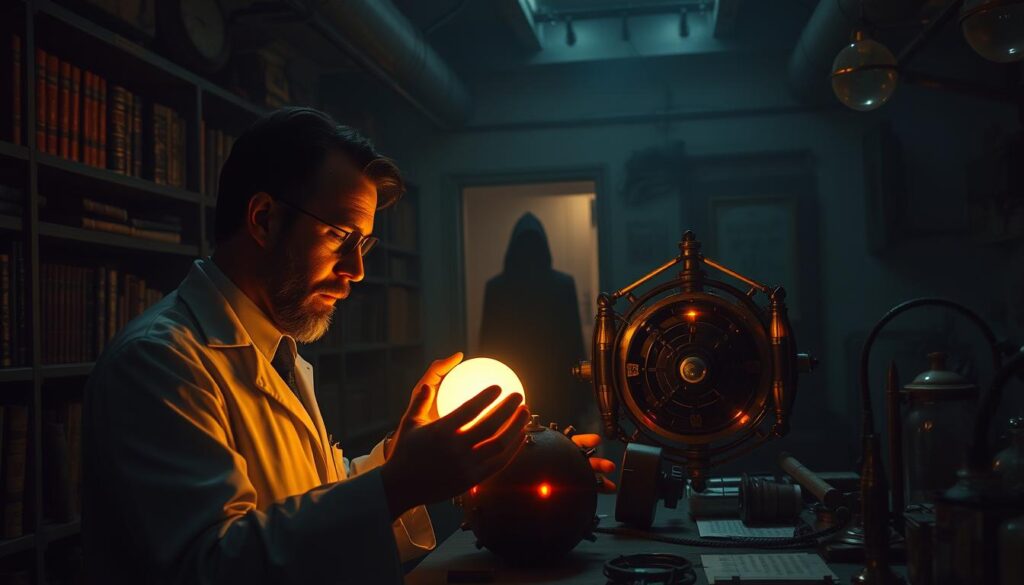
The CIA’s Stargate Project famously explored remote viewing—using the mind to spy across distances. Though controversial, it highlights how seriously institutions have taken these abilities. Even pop culture reflects this, with characters like Eleven from Stranger Things embodying modern psychic archetypes.
Scientists now study the “spectrum theory,” where everyday intuition might blend into heightened perception. Brain scans reveal unusual activity during psychic claims, suggesting our minds could hold untapped potential. Yet, skepticism remains vital—many “abilities” stem from cold reading or coincidence.
This balance—between open inquiry and critical thinking—fuels the debate. Whether a gut feeling or a vision of future events, the mystery endures. As research evolves, so does our understanding of human consciousness.
2. What Are Psychic Powers? Defining the Unexplained
The line between intuition and unexplained mental phenomena remains blurred in scientific discussions. These extraordinary capabilities often involve perceiving information beyond normal sensory channels. Researchers categorize them as anomalous cognition – experiences that challenge conventional understanding of human perception.

Psychic Abilities vs. Intuition: Is There a Difference?
Gut feelings differ from structured psychic practices in several key ways. Intuition operates subconsciously, while trained individuals claim to access information deliberately. This distinction mirrors the difference between casual observation and scientific measurement.
| Intuition | Psychic Practices |
|---|---|
| Automatic subconscious processing | Conscious information seeking |
| Common everyday experience | Requires specific training |
| Based on environmental cues | Claims independence from physical stimuli |
“The brain may process information through channels we don’t yet understand. What some call psychic ability could be an extension of natural perception.”
The Role of Energy in Psychic Phenomena
Many traditions describe an energy body that interacts with physical reality. The chakra system suggests specific energy centers, while scientific studies examine electromagnetic fields around living organisms. Both approaches attempt to explain how information might transfer beyond normal means.
Fictional examples like Professor X’s Cerebro device parallel real-world psychometry cases. Practitioners claim to read object histories through touch, suggesting residual energy patterns. Research continues into whether these phenomena have measurable physical correlates.
The “Clair” spectrum describes various perceptual types:
- Clairvoyance: Visual information beyond sight
- Clairsentience: Physical sensation of distant events
- Claircognizance: Sudden knowing without explanation
- Clairaudience: Hearing beyond normal range
Marvel’s Psylocke and Pokémon’s Mewtwo showcase exaggerated versions of these concepts. While entertainment simplifies the ideas, they reflect genuine questions about mind-matter interaction that science continues to explore.
3. The Science Behind Psychic Abilities
Scientific labs have tested extraordinary claims for decades, yielding surprising results. While some studies suggest untapped human potential, others highlight flaws in methodology. This duality fuels ongoing debates.
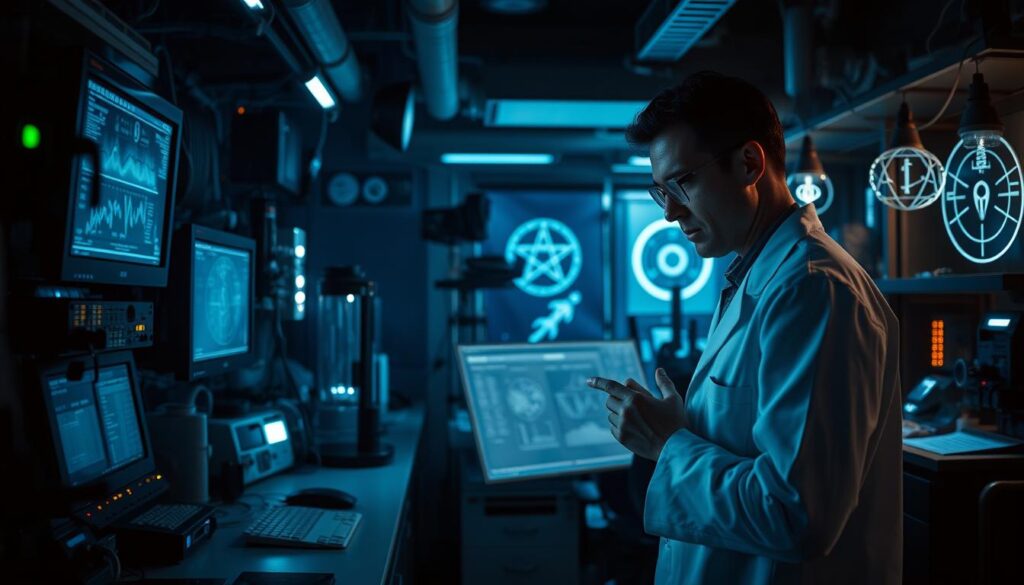
Notable Scientific Experiments
The Rhine Institute’s Zener card tests (1930s) measured telepathy with symbols like stars and waves. Though criticized, they sparked modern parapsychology. Later, the PEAR Lab analyzed 28 years of remote viewing data, finding slight but statistically significant hits.
| Experiment | Findings | Criticism |
|---|---|---|
| CIA’s Stargate Project | Declassified reports showed 65% accuracy in some sessions | Subjectivity in data interpretation |
| Stanford (Uri Geller) | Metal-bending claims under controlled conditions | Potential sleight-of-hand |
“The replication crisis plagues parapsychology. Without consistent results across labs, it’s hard to dismiss chance or bias.”
Why Skepticism Persists
Neurotransmitter theories, like DMT in the pineal gland, lack conclusive evidence. Similarly, Marvel’s “headache effect” mirrors real claims of mental fatigue—but correlation isn’t causation.
- Replication Issues: Only 30% of studies reproduce initial results.
- Placebo Effects: Belief shapes perception, complicating verification.
- Methodological Flaws: Small sample sizes or loose controls damage credibility.
Yet, anomalies persist. A 2021 meta-analysis found a 0.2% above-chance effect in precognition tests—tiny but unexplained. Science demands rigor, but the mystery endures.
4. Types of Psychic Abilities: From Clairvoyance to Telepathy
Human perception extends beyond the five senses in ways science is still exploring. Researchers categorize these phenomena into distinct types, each with unique characteristics. Some abilities, like remote viewing, have even been studied by government agencies.

Clairvoyance: Seeing Beyond the Physical
This form of perception involves visual information without using physical eyes. Some report seeing events happening miles away, while others perceive auras around people. The X-Men character Destiny demonstrates an exaggerated version of this ability.
Precognition: Glimpses of the Future
Unlike Minority Report’s flawless predictions, real precognitive experiences are often fuzzy. Studies at the Maimonides Medical Center recorded dreams that matched future events. These cases suggest our brains might process time differently than we understand.
“Precognitive dreams don’t show the future like a movie. They’re more like symbolic warnings our conscious mind must interpret.”
Telepathy: Mind-to-Mind Communication
While Professor X reads thoughts effortlessly in comics, real cases are subtler. Twin studies show some siblings guessing each other’s thoughts with surprising accuracy. This suggests a potential biological basis for mental connections.
Psychometry: Reading Objects’ Energy
Practitioners claim to sense history by touching things like jewelry or clothing. Police have occasionally consulted psychics on cold cases, with mixed results. The technique resembles how Aelissa from Psychic Light operates, though real applications remain controversial.
Remote viewing represents a special type of perception tested in CIA programs. Declassified documents show participants attempting to describe distant locations. While results were inconsistent, some accurate details emerged that challenge conventional explanations.
5. Famous Cases of Psychic Phenomena
Declassified documents expose government experiments with extraordinary perception. These records reveal how world powers secretly explored mental abilities for intelligence purposes. Simultaneously, celebrity claims keep the debate alive in popular culture.
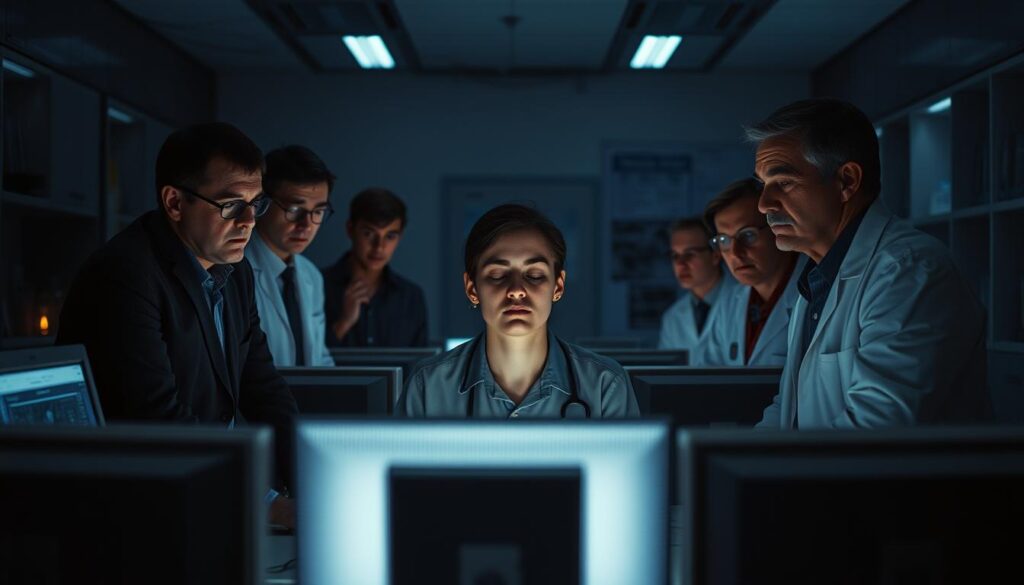
Government Programs Like Remote Viewing
The CIA’s Stargate Project (1978-1995) trained operatives in remote viewing—describing distant locations mentally. Declassified files show some startling successes, like identifying a Soviet submarine facility. Yet critics argue these were lucky guesses among many failures.
Post-9/11, the Defense Intelligence Agency reportedly consulted psychics for counterterrorism. While details remain classified, insiders suggest mixed results. The Pentagon even tested Uri Geller’s spoon-bending claims, though no military application emerged.
“Soviet archives confirm they spent millions on psychic research during the Cold War. Both sides feared falling behind in this unconventional arms race.”
Celebrities and Psychic Claims
TV psychic Sylvia Browne famously—and incorrectly—predicted missing people would be found alive during high-profile cases. Conversely, Tyler Henry’s Hollywood Medium show features emotional readings that some families verify.
Fraud cases like “The Psychic Twins” contrast with intriguing anecdotes. Marvel’s Scarlet Witch embodies our cultural fascination, blending science fiction with ancient concepts of mental powers. These stories reflect humanity’s enduring curiosity about perception beyond normal limits.
For more on how institutions handle sensitive information about unusual phenomena, review our privacy policy guidelines regarding confidential research.
6. The Brain and Psychic Powers: A Neurological Perspective
Neuroscience offers fresh insights into how the brain might process information beyond ordinary limits. Advanced imaging reveals fascinating patterns during unusual mental experiences. These findings challenge our understanding of human potential.
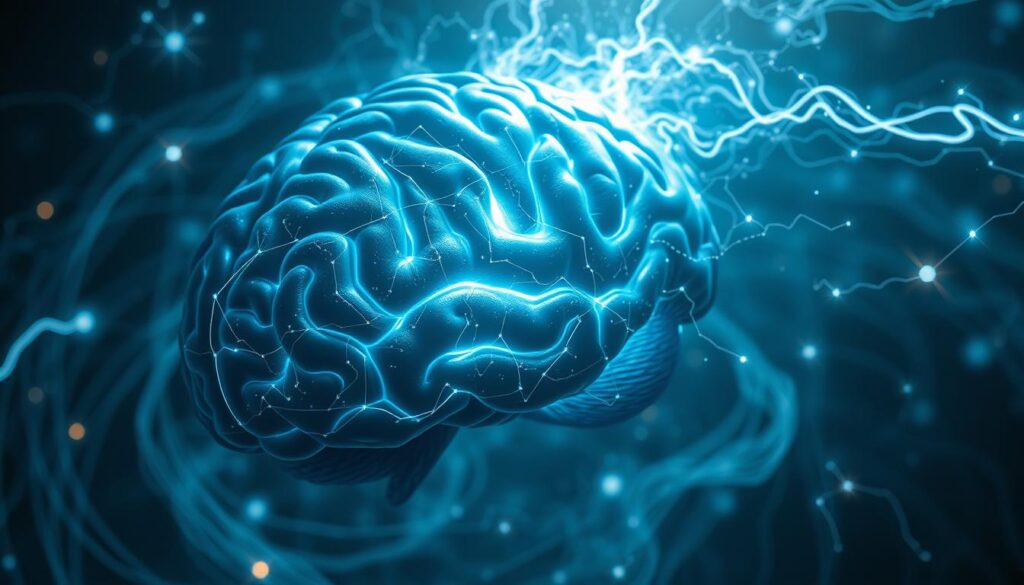
The Role of the Subconscious Mind
The default mode network activates when people report psychic experiences. This brain system handles internal focus and daydreaming. Some researchers suggest it might facilitate unconventional information processing.
Savant syndrome shows how the brain can develop extraordinary abilities. Though rare, these cases demonstrate untapped mental potential. They often emerge after brain injuries or in autism spectrum conditions.
“fMRI scans of mediums show distinct patterns between genuine channeling and acting. The prefrontal cortex behaves differently when accessing information unconventionally.”
Neuroplasticity and Enhanced Perception
Meditation appears to boost certain perceptual abilities. NIH studies found expert meditators had increased neurogenesis in the hippocampus. This brain region handles memory and spatial awareness.
Ketamine therapy temporarily enhances ESP-like effects in some patients. The drug alters glutamate transmission, creating unusual brain states. These findings suggest chemical influences on perception.
| Brain State | Associated Ability | Scientific Support |
|---|---|---|
| Temporal lobe epilepsy | Mystical experiences | Strong clinical correlation |
| Deep meditation | Enhanced intuition | Moderate EEG evidence |
| Psychedelic states | Expanded awareness | Emerging research |
The healing potential of these states intrigues researchers. Some patients report improved body awareness and emotional processing. However, science still debates whether these effects extend beyond normal senses.
7. Debunking Myths About Psychic Powers
Behind the curtain of psychic performances lies a complex web of psychological techniques. While some claim extraordinary perception, science reveals how ordinary tricks create illusions of supernatural ability.

The Cold Reading Playbook
Columbia University’s study exposed how “shotgunning” works. Psychics throw out vague statements that could apply to anyone, like “You’ve experienced loss” or “A tall man influences your life.” Listeners naturally connect these to personal experiences.
James Randi’s $1M challenge tested these claims scientifically. Not one participant could demonstrate real ability under controlled conditions. The techniques used instead include:
- Fishing: Asking leading questions to gather information
- Barnum Statements: Generic phrases that sound personal
- Hot Reading: Researching clients beforehand
“Cold reading isn’t about seeing the future—it’s about reading emotions and body language in the present moment.”
The Psychology Behind Belief
The placebo effect works in readings too. When people expect spiritual guidance, their brains form connections where none exist. University studies show this confirmation bias makes us remember hits and forget misses.
| Technique | How It Works | Scientific Term |
|---|---|---|
| Vague Predictions | Statements that could fit many situations | Forer Effect |
| Selective Memory | Remembering accurate parts, forgetting errors | Confirmation Bias |
| Emotional Triggers | Using sound and tone to create atmosphere | Affective Priming |
TV psychics often edit hours of footage down to “amazing” moments. In contrast, verified researchers like those at Psychic Light use strict protocols. The difference highlights why skepticism remains crucial in this field.
8. Can Anyone Develop Psychic Powers?
Many wonder if extraordinary perception is an innate gift or a skill that can be cultivated. Research suggests certain techniques may enhance intuitive abilities, though results vary by individual. With consistent practice, some report noticeable improvements in their sensitivity to subtle cues.

Techniques to Enhance Intuition
The CIA’s declassified training manuals reveal fascinating methods for developing the “Three Clairs”:
- Clairvoyance: Practice visualizing distant locations with eyes closed
- Clairsentience: Focus on physical sensations when holding objects
- Clairaudience: Meditate while listening to subtle environmental sounds
Psychic Light’s 30-day bootcamp incorporates these techniques with modern neuroscience. Participants report improved dream recall and daytime awareness after completing the program.
“Binaural beats at specific frequencies can stimulate the pineal gland, potentially enhancing perception. We’ve measured increased gamma wave activity during these sessions.”
The Role of Meditation and Mindfulness
Daily meditation appears crucial for developing sensitivity. Studies show just 20 minutes per day can:
| Practice | Effect | Timeframe |
|---|---|---|
| Focused breathing | Increases alpha waves | 2 weeks |
| Object scanning | Enhances tactile sensitivity | 30 days |
| Loving-kindness meditation | Boosts emotional perception | 8 weeks |
Diet also plays a role—reducing fluoride and increasing antioxidants may support pineal gland function. However, experts warn against unsupervised practice, as intense mental exercises can sometimes trigger temporary disorientation.
While not everyone will develop extraordinary abilities, these methods can sharpen natural intuition. The key is consistent, patient practice combined with healthy skepticism about results.
9. Expert Opinions on Psychic Phenomena
Experts remain deeply divided about the validity of extraordinary perception. While some researchers present compelling evidence, others dismiss it as pseudoscience. This split reveals fundamental questions about how we understand human consciousness.
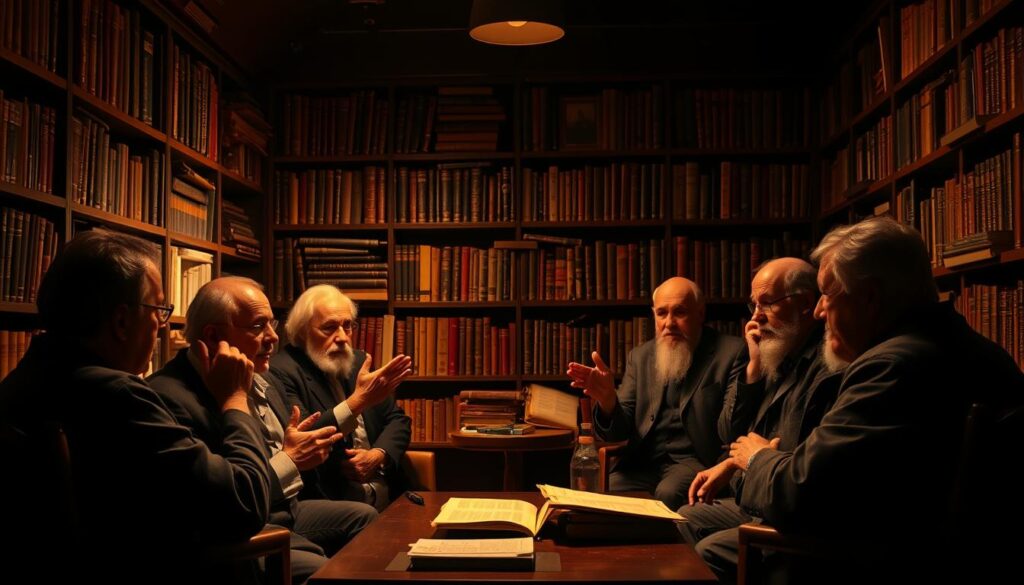
Psychologists’ Take on ESP
The American Psychological Association maintains a neutral stance, acknowledging anomalies but calling for more research. Prominent figures represent both sides of the debate:
- Dr. Dean Radin presents meta-analyses showing small but significant ESP effects across studies
- Dr. Richard Wiseman counters that methodological flaws explain these results
- Carl Jung’s synchronicity concept finds new applications in parapsychology research
“The data don’t lie—when you combine hundreds of experiments, the odds against chance become astronomical. But we still need better theories to explain how this information transfer might work.”
Spiritual Leaders’ Perspectives
Religious traditions offer diverse views on extraordinary mental abilities. The Dalai Lama recognizes clairvoyance as a real but rare spiritual accomplishment. Buddhist texts describe siddhis—special powers developed through advanced meditation.
Meanwhile, Vatican experts caution about distinguishing divine gifts from deceptive influences. Their exorcism manuals provide guidelines for evaluating unusual claims. These contrasting views show how culture shapes interpretation of mental phenomena.
Modern quantum physics adds another layer, with some theorists proposing consciousness as fundamental to reality. While controversial, these ideas bridge scientific and spiritual perspectives on human potential.
10. Conclusion: The Verdict on Psychic Powers
DARPA’s cutting-edge research suggests we may be entering a new era of understanding consciousness. Stanford studies show intriguing brain patterns during extraordinary perception claims, while skeptics highlight replication challenges.
Military programs continue exploring potential applications, from remote viewing to enhanced intuition training. Yet ethical concerns remain about weaponizing these abilities.
For those curious about developing sensitivity, focus on meditation and verified techniques. Quantum consciousness research may soon reveal new ways our minds interact with reality.
As the X-Men wisely noted: “The truth is out there…but so are lies.” Stay open yet discerning in your exploration of human potential.

